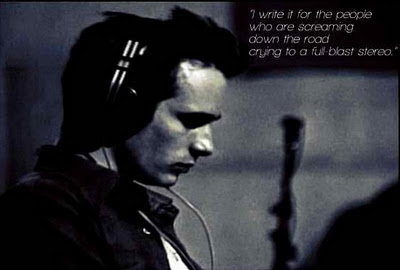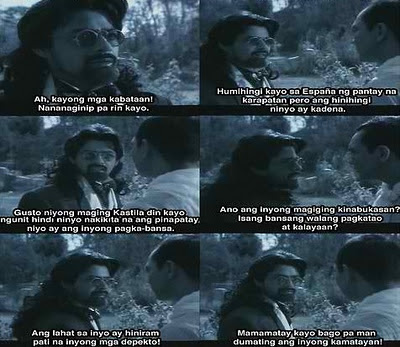
Tuesday, December 27, 2011
GRACEFUL EXIT

Friday, December 9, 2011
THE WORLD IS BIG


Friday, November 25, 2011
WALK TO FREEDOM
Thursday, November 17, 2011
JEFF WHO?: BIRTHDAY CHEERS TO THE LATE JEFF BUCKLEY

Saturday, November 12, 2011
ARRYTHMIA
Friday, October 28, 2011
THE PERFECT DRUG
That explains why I get abnormally down when I hear Christmas songs. People find it funny, but those beautiful tunes remind me that down time's here again. I sleep longer than usual, feel more comfortable being alone, and eat more as a defense mechanism. Despite the excitement and the hype of the holidays, my biological clock tends to run slower than usual with the absence of light. I hate it when I get out at 6pm and the evening sky looks like a 10pm. I usually just recover when the 6pm sky looks like a 4pm again --- but that can happen only when summer approaches.

Sunday, October 23, 2011
PROJECT: LIBERATION



Sunday, October 16, 2011
MONDAY SICKNESS?




Saturday, October 15, 2011
THAT PERFECT ARTICLE
Tuesday, July 26, 2011
Genuine and Essential: A Take on Cinemalaya 7's "Ang Sayaw ng Dalawang Kaliwang Paa"
by Ayn Torres
Admittedly, poetry is a territory quite a significantly huge audience nowadays finds daunting, intimidating, or simply incomprehensible, at the very least. If not for classroom requriements and discussions, I highly doubt if average teenagers would busy themselves collating notes on image-stricken verses and rhyme-induced lines. That’s why when I was browsing through the synopsis of this year’s Cinemalaya I was particularly struck with Alvin Yapan’s “Ang Sayaw ng Dalawang Kaliwang Paa,” being a Philippine poetry fan myself. So by Thursday I immediately got tickets in advance, wishing we won’t miss another target this time since we heard screening for entries this year unusually got easily sold out. I waited for Sunday with much anticipation, thinking how the hell would these new breed of filmmakers fuse my beloved literary genre with an art I don’t exactly find as equally interesting--- dance.
True enough Yapan proved how hard-hitting his movies can get. After “Ang Panggagahasa Kay Fe” which won the hearts of the international independent film community, “Sayaw” proved to be another poetry, but this time, in motion.
If you don’t look closely, you could easily dismiss the plot as quite common, perhaps something you’ve heard quite some time ago. The story revolves around Marlon, a well-to-do college student whose admiration for his literature professor Karen pushed him to hire his classmate Dennis to teach him basic dance lessons after learning Karen moonlights as a dance instructress after their classes. Marlon merely wanted to impress Karen through the secret dancing sessions but instead develops a certain interest in the art of dance, and a special bond with Dennis that later on complicated matters. The story therefore is not cliché, but rather familiar, something we know happens but we tend to ignore. This is where Yapan uses his strength in telling stories that tackle gender, this time surprisingly from a masculine point of view.
The issue of gender politics has been one that society continuously tries hard to address, focusing more often on pushing for equality between the female and the male. Intentionally, not much is discussed about Karen’s background; but the feminist poems used in the film helps the audience understand her standpoint on the politics of gender as she tears the verses into bits and pieces, in the process keeping a considerable distance between the two male leads. Dance, on the other hand, was creatively used to ask an intelligent question: in a society comprised of masculine figures or ‘two left feet,’ who dare leads and who follows? There’s no other way to discuss this but to introduce the subject matter of homosexuality, a topic whose concept has often been twisted by the unforgiving culture of the new media. “Sayaw” allowed me to feel how this gender group deeply feels by eliminating the formulas of physical contact and words to show affection --- it simply poured pure emotions through the arts, that one ought to forget it’s angling towards a kind of love exclusive between merely one gender. The issues were beautifully interwoven yet individually given due time for exploration.
Execution was exceptional. The story-telling was non-linear; but instead of flashbacks, the film moved in a back and forth motion, just like how one does it with waltz--- slow yet with high precision in every point of the toe. The first ten minutes showed a beautiful capture of the setting, which is unusually steady, shot mostly inside FEU. The use of contemporary Filipino poetry --- 6 poets including Ophelia Dimalanta, Rebecca Anonuevo, Merlinda Bobis, Joi Barrios, Ruth Mabanglo, and Benilda Santos --- was a very challenging task yet beautifully rendered, paired with the interpretative choreography of Eli Jacinto. Music, too, played a significant part in helping the audience feel every emotion conveyed by the characters. The actors might not be great dancers, but they sure did the characters justice. Jean Garcia personified Karen’s strong figure of an ever-knowing feminist living by herself, standing by the arts in which she believes in, yet ironically dismisses the idea of pursuing it as a living. Paulo Avelino effectively portrayed Marlon, tactfully exhibiting his character’s slow progression from a young stalker to an enlightened performer who finally understood the intersections of poetry and dance, evident in the poignant delivery of the last scene that left the audience with nothing but pure awe. But I guess the stand-out was Rocco Nacino, whose subtle acting brought those very meaningful scenes straight to the soul. Though not the lead, he gave Dennis’ character so much life and soul. Nacino was convincingly gay, piercingly glancing with so much expression at Marlon several times. It was a hard act, given that his character can’t overtly be depicted as a straightforward homosexual like Maxi from “Ang Pagdadalaga ni Maximo Oliveros” or Wilson from “Last Supper No. 3.” Rocco’s solo dance to the lines of Joi Barrios’ “Paglisan” was one of the unforgettable highlights that one can call silent killers, extending to the viewers the poem’s every line that suggests the pain of one being left behind.
I believe “Sayaw” revolutionized the stereotyped elements of Philippine independent cinema. It has been a joke that to be able to win the critics’ nod both locally and internationally, you have to show and emphasize at least one of these --- poverty, gay element, and prostitution. “Sayaw” might have been set in the third world, but not one scene did I see dumps of trash and shanties filled with grimy street children. It might have raised concerns on gender particularly gay issues, but there was not one hug nor kiss, but merely glances that weren’t malicious but artistically meaningful and will surely not freak homophobics out. “Sayaw”’s emphasis was on the arts and how the issues were told, not on any other attention-grabbing ‘realities.’ It was a huge risk for Alvin Yapan and Alemberg Ang to approach the chosen issues in a rather serious manner since observably, the audience nowadays leans to a lighter picture of reality seeing how they enjoy the humor of “Last Supper No. 3” and this year's winner “Ang Babae sa Septic Tank.” Nevertheless “Sayaw”’s attack was spotless, at times even unbelievable.
“Sayaw” is not merely a reminder of forgotten arts and issues of society; it is a big question on where do you stand as a Filipino. Although it might take a while for some percentage of the audience to healthily comprehend the issues in “Sayaw,” the film helps us recognize what merely is genuine and essential as we continue to live our interwoven lives. #
